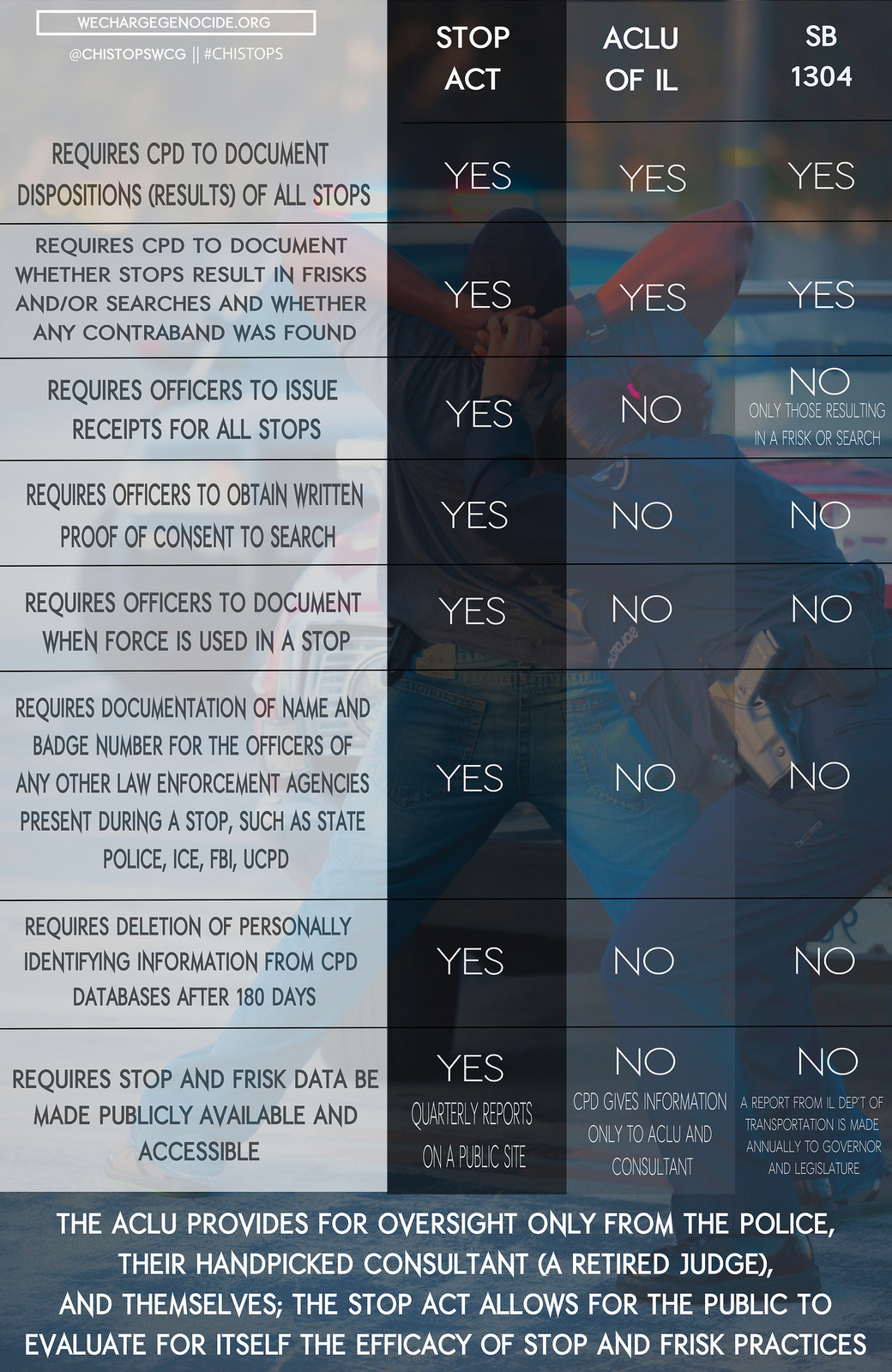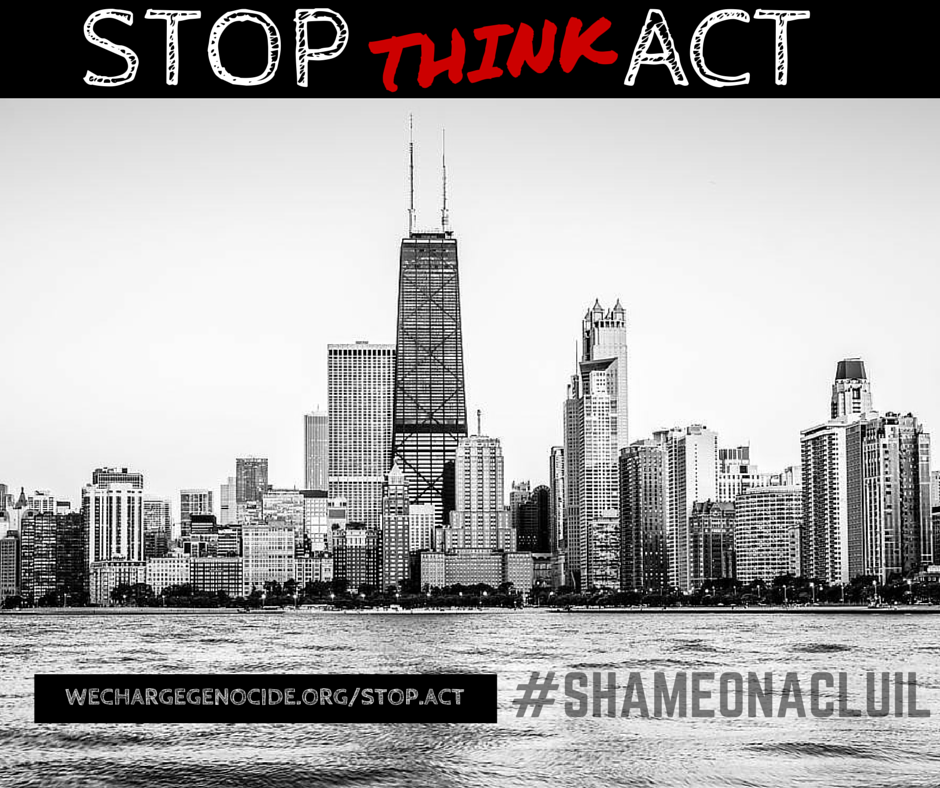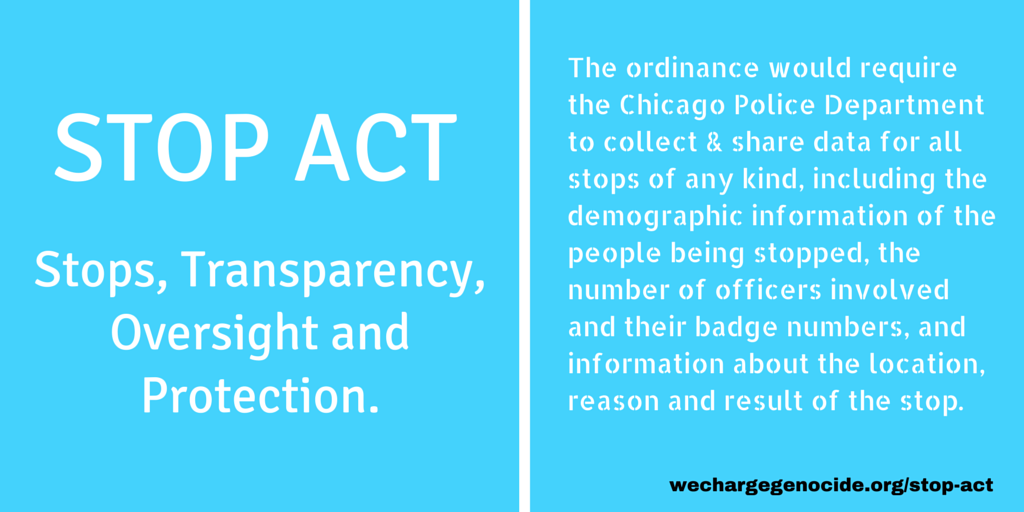
Comparison of STOP Act to ACLU-IL deal with CPD and SB1304 (Click on image for larger version)
In light of the announcement of the ACLU of Illinois’s agreement with the City of Chicago, and in the interest of transparency with the people of Chicago affected by this agreement and the Chicago Police Department’s stop and frisk practices, we are sharing the following open letter to the ACLU. The letter outlines the process through which the ACLU negotiated its agreement—a process that excluded and undermined Black youth leadership around stop and frisk; it describes the fundamental differences between the substance of the ACLU/CPD agreement and the STOP Act developed by WCG; and reaffirms our commitment to the struggle against all forms of police violence.
WCG does not naively believe that our communities are harassed, brutalized, and abused by the police simply because there is insufficient data, or because there are not enough laws on the books. We understand police violence to be rooted in historical and systemic anti-blackness that seeks to control, contain, and repress Black bodies through acts of repeated violence. Stop and frisk should be understood as a tool police use to punish Black people just for being. Police violence is always state-sanctioned violence, and further strengthening narrow supervision of police action by elites will never address that. This is why any legislative or law-based campaign to address police violence requires not just policy change, but an actual transformation of power relations between communities of color and the police. The ACLU’s settlement—focused on your own access—does not and cannot accomplish this.
+++++++++++++++++++++++++++++++
An Open Letter to the ACLU of Illinois Regarding Stop and Frisk
American Civil Liberties Union of Illinois
180 N. Michigan Avenue, Ste. 2300
Chicago, Illinois 60601
Dear ACLU of Illinois:
We are writing in complete dismay and utter disgust upon learning—on the very day we were filing the Stops Transparency Oversight and Protection Act (“STOP Act”) in Chicago’s City Council—that you were in the midst of finalizing a “settlement” with the Chicago Police Department (CPD) and Mayor Emanuel’s office on the collection of stop and frisk data by the CPD. As a result of these secret negotiations, Mayor Emanuel requested that our aldermanic sponsors Proco Joe Moreno, Roderick Sawyer and Roberto Maldonado delay filing our ordinance until the September City Council meeting. In light of the Mayor’s request, after consulting with our aldermanic sponsors, we did not file the STOP Act despite We Charge Genocide (WCG) and Chicago Votes’ announcement that we would at a packed press conference that very morning. The press conference itself was built upon several months of organizing and outreach by and to scores of youth of color in the City of Chicago in anticipation of the STOP Act’s introduction at City Council.
The ACLU’s unprincipled failure to inform WCG about these negotiations as soon as they were initiated and invite WCG to participate in them has directly undermined and undercut the organizing and advocacy efforts of Black youth who are targeted by stop and frisk and discriminatory policing in Chicago. You failed to be transparent that these negotiations were taking place and excluded the input of community partners—especially the youth directly impacted by the issue that is the subject of the legislation and who are fighting for their lives. This letter uplifts their critical work and serves as a warning to others who consider the ACLU a collaborator or partner. It is precisely this unprincipled and frankly shameful betrayal of impacted communities and grassroots organizing efforts that the ACLU claims to fight for that gives the organization its reputation for undercutting rather than supporting movements for change across the country.
Now, we learn that as a result of your secret and exclusive negotiations with the City you have reached an agreement with the CPD and Mayor Emanuel’s office on the collection of stop and frisk data, and your agreement does not provide the public with access to that data. Rather, under your agreement, only the ACLU and the designated “Consultant” will receive CPD stop and frisk data and other relevant information. Under your agreement, you are required to keep the information you receive confidential under an “attorney’s eyes only” standard. This result flies in the face of the public transparency and accountability that the STOP Act sought to secure—principles the ACLU allegedly propounds. We want to be clear: We are not in support of your work with the city or its result, which harms our existing work and undermines the broader campaign to end stop and frisk in Chicago.
WCG’s Campaign on Stop and Frisk
WCG raised the issue of racially discriminatory stop and frisk practices in September 2014 in its shadow report to the UN Committee Against Torture (CAT). After the CAT issued its profoundly favorable findings in response to the WCG’s all youth-of-color delegation and the shadow report they drafted, WCG began developing our next steps, including advocating for the collection and publication of all stop and frisk data by the CPD. Over the course of the last ten months, WCG began a broad campaign to educate and mobilize youth of color across Chicago to end CPD’s racially discriminatory stop and frisk practices, which has included launching the #ChiStops campaign, recruiting Chicago Votes to work alongside WCG in seeking the passage of the STOP Act, and going to classrooms and schools across the City to do the hard and essential work of building knowledge and support for the legislation among Black youth as young as eight who face discriminatory stops and abuse at the hands of the CPD every single day.
WCG’s Communications with ACLU-Illinois
The ACLU Illinois has known for several months that WCG intended to seek mandated collection and publication of CPD’s stop and frisk data through Chicago’s City Council. It was first raised to the ACLU-Illinois in November, 2014, and later when WCG members met with the ACLU-Illinois at your office on April 7, 2015. At that meeting, WCG shared a draft of the proposed ordinance, and you indicated the ACLU’s plan was to amend Illinois state law. You also informed us that you supported the STOP Act. You never suggested that WCG should not pursue the campaign to pass the STOP Act in Chicago’s City Council or that the ACLU was interested in working with the City to address this issue. You only asked us to refer any potential plaintiffs to you for a hypothetical lawsuit regarding stop and frisk. We subsequently emailed the ordinance to you and you provided us with feedback and edits which we wholeheartedly accepted.
The Illinois legislature then passed a bill, SB1304, on the collection of stop and frisk data that provided only half of what the STOP Act sought to achieve. WCG reached out to an ACLU-Illinois member on June 5, 2015 to discuss the SB 1304 and discussed the continuing need for the STOP Act. WCG then followed up with you ACLU to get your official endorsement of the STOP Act, which you provided and we informed you on July 1, 2015 that WCG would send out a press release and file the STOP Act on Wednesday, July 29 at the City Council meeting.
In light of this history, it was mind-boggling to learn that you have been in negotiations with the City without informing us prior to July 29th. Common decency—let alone respect for the communities’ interests you claim to represent—would compel you to inform us of these developments. True solidarity, however, would have required you to not only inform us of your negotiations, but reach out to WCG’s youth members before even initiating or participating in them to discuss whether such negotiations should even be entered into, and on what terms.
Instead, you have chosen to shut us out of these negotiations entirely and even initially refused to disclose the possible terms of the “settlement” after the July 29th press conference. You only disclosed the terms of your deal to us on August 6th, the day you signed off on the deal with the CPD and Corporation Counsel, which was the same day you chose to meet with us. It was only then did we learn the true extent in which you undermined and undercut the efforts of WCG, Chicago Votes and Black youth who have been organizing against stop and frisk. Your actions evince a clear lack of respect and disregard for WCG and the communities impacted by the issue, and have completely disrespected and disregarded the many hours of work by the youth of color who are, in fact, those most impacted by stop and frisk.
The ACLU-Illinois’ Unacceptable Deal with the CPD
We Charge Genocide’s STOP Act is rooted in the experiences and ideas of those most directly impacted—young Black and Brown people. It is the strong desire of the youth we work with that data on stops and frisks be not only collected, but be made publicly available on a City website every three months as a guarantee of actual transparency. The settlement you agreed to with the City fails to do this. Now, only you and the Consultant are provided with the relevant data and information—and on a confidential attorney’s eyes only basis. All other members of the public must seek the information through the FOIA process, which makes the information both inaccessible and hard to decipher if obtained. Your agreement with the City thus maintains the status quo, in which an elite knowledge of the FOIA process is required to access and review stop and frisk data. This is unacceptable.
Additionally, we prioritized mechanisms in the STOP Act that would immediately reduce some of the harm caused by stop and frisk practices, e.g. issuing receipts after a stop that include the name and badge number of the police officers and requiring police officers to obtain written documentation of someone’s consent to search. These components of the STOP Act are critical parts of addressing the injustices experienced by young Black Chicagoans every day. They provide people with necessary information to complain about their encounters and attempt to hold the officers responsible while also being provided information as to their rights. Your settlement, however, does not include these pieces; it instead places more power, trust, and responsibility in the hands of those who brutalize us: the cops and the courts. If you had informed us of your negotiations with the City and respected the leadership of young Black people, the ACLU-Illinois would have known that we consider these elements to be non-negotiable aspects of any legislative measures regarding stop and frisk.
We do not naively believe that our communities are harassed, brutalized, and abused by the police simply because there is insufficient data, or because there are not enough laws on the books.
We understand police violence to be rooted in historical and systemic anti-blackness that seeks to control, contain, and repress Black bodies through acts of repeated violence. Stop and frisk should be understood as a tool police use to punish Black people just for being. Police violence is always state-sanctioned violence, and further strengthening narrow supervision of police action by elites will never address that. This is why any legislative or law-based campaign to address police violence requires not just policy change, but an actual transformation of power relations between communities of color and the police. Your settlement—focused on your own access—does not and cannot accomplish this.
What you have “won” is fundamentally different from the STOP Act, both in its means and in its ends. Our goals are rooted in the experiences of those most directly impacted; yours are not. Our movement is rooted in a political analysis that recognizes the need to shift power away from police and into our communities; your policy “victory” is not. Our motivation is rooted in a theory of change that prioritizes movement building and centering the leadership of those most affected; yours is not. Now, because of your self-serving interest in pushing simplistic policy changes, we and our allies face a much harder task pushing the critical package of reforms included in the STOP Act but ignored in your settlement. There is no such thing as an easy victory, and yours has come at a high cost.
Furthermore, as we expressed in our August 6th meeting, it is highly disingenuous to claim this victory as a result of the usual non-profit legal advocacy work of the ACLU. The City’s desire to negotiate with you has much to do with WCG and the larger Black Lives Matter movement’s demands for radical change. Your settlement represents just one of many efforts by City officials across the country attempting to co-opt our movement by engaging with less threatening groups. Passage of the STOP Act would be public recognition of the real, grassroots power of young Black and Brown Chicagoans; instead the City wisely sought to settle into an ongoing relationship with a legal organization that poses no real threat to the status quo. In other words, you were used.
Data collection through the STOP Act was the first of many steps in our plan to end to stop and frisk in Chicago. You have disrespected us. You have undermined our movement. You have wasted our time and that of our allies. But, your refusal to acknowledge or take seriously our leadership has neither silenced nor weakened us. We understand freedom will take a while and will not come without a fight. We are proud of what we have accomplished. We are proud of the base-building and power-building we have achieved. We are proud of our young Black leaders and their ongoing work. We are proud of our success. We will continue and build on that strong foundation in the coming weeks, months, and years. That is how we will win. That is how we will make Black lives matter.
“It is our duty to fight for our freedom.
It is our duty to win.
We must love each other and support each other.
We have nothing to lose but our chains.”
Signed,
We Charge Genocide
Black Lives Matter – Chicago







